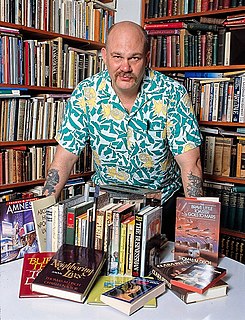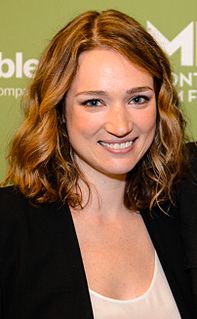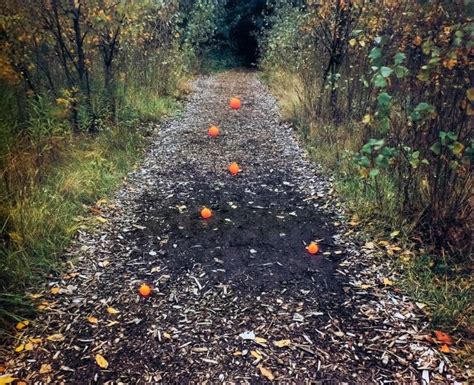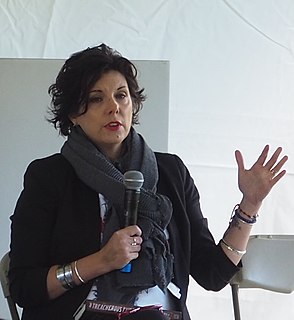A Quote by Michael Ondaatje
…Even the idea of a city never entered his mind. It was as if he had walked under the millimeter of haze just above the inked fibers of a map, that pure zone between land and chart, between distances and legends, between nature and storyteller. The place they had chosen to come to, to be their best selves, to be unconscious of ancestry. Here, apart from the sun compass and the odometer mileage, and the book, he was alone, his own invention. He knew during these times how the mirage worked, the fata morgana, for he was within it.
Related Quotes
For him who is perfect in love and has reached the summit of dispassion there is no difference between his own or another's, or between Christians and unbelievers, or between slave and free, or between male and female. But because he has risen above the tyranny of the passions and has fixed his attention on the single nature of man, he looks on all in the same way and shows the same disposition to all. For in him there is neither Greek nor Jew, male nor female, bond not free, but Christ who 'is all, and in all' (Col. 3:11; cf. Gal. 3:28).
Melville had to fight, fight against the existing world, against his own very self. Only he would never quite put the knife in the heart of his paradisal ideal. Somehow, somewhere, somewhen, love should be a fulfillment, and life should be a thing of bliss. That was his fixed ideal. Fata Morgana. That was the pin he tortured himself on, like a pinned-down butterfly.
... He went under the stars, and the tender light of the moon, when it hung like an eyelash and the tree trunks shone like bones. He walked through wind and weather, and beneath sun-bleached skies. It seemed to Harold that he had been waiting all his life to walk. He no longer knew how far he had come, but only that he was going forward. The pale Cotswold stone became the red brick of Warwickshire, and the land flattened into middle England. Harold reached his hand to his mouth to brush away a fly, and felt a beard growing in thick tufts. Queenie would live. He knew it.
Before he died, Harry said that his wife knew everything about every trick that he did, and that she knew how they all worked. It was interesting to play with that idea, and to find the places where she really was afraid for his safety and where she was playing along. I had to find that line between what's a performance and what's real, and that's so much of what magic is, as well. It was really, really fun. They were really partners, in every sense of the word.
In comparing these two writers, he [Samuel Johnson] used this expression: "that there was as great a difference between them as between a man who knew how a watch was made, and a man who could tell the hour by looking on the dial-plate." This was a short and a figurative statement of his distinction between drawing characters of nature and characters only of manners, but I cannot help being of opinion, that the neat watches of Fielding are as well constructed as the large clocks of Richardson, and that his dial plates are brighter.
Somehow I felt that if Fox Talbot had had more time and more drawing talent, he would have filled in the interval between his two drawings and made a complete panorama. Now, 163 years later, I was able to use his great invention to elaborate on his youthful dream of capturing and fixing the fleeting image. In doing so, I may also have added another little bit to the soul of this extraordinary place.
I stepped closer still. He closed his eyes again and covered my hand with his own. 'You smell of violets. You always smell of violets,' he said. 'You've no idea how many times I have walked these moors and smelled them and thought you were near. On and on I walked, following the scent of you, and you were never there. When I saw you in the hall tonight, I thought I had finally gone mad.
And in some way, Clary thought, he meant it, meant his gratitude. He had long ago lost the ability to distinguish between force and cooperation, between fear and willingness, between love and torture. And with that realization came a rush of numbness—what was the point of hating Valentine for being a monster when he didn’t even know he was one?
The infinitesimal seedlings became a forest of trees that grew courteously, correcting the distances between themselves as they shaped themselves to the promptings of available light and moisture, tempering the climate and the temperaments of the Scots, as the driest land became moist and the wettest land became dry, seedlings finding a mean between extremes, and the trees constructing a moderate zone for themselves even into what I would have called tundra, until I understood the fact that Aristotle taught, while walking in a botanic garden, that the middle is fittest to discern the extremes.
When a lion stalks a herd, he sneaks in close, lies down, and surveys them to choose his victim. He takes his time. The deer or buffalo have no idea he’s near. He finds his prey and then he explodes from his hiding place and grabs it. Even if another, perfectly serviceable animal ends up within his reach, he isn’t going to alter his course. He has chosen, and he would rather go hungry than change his mind.







































